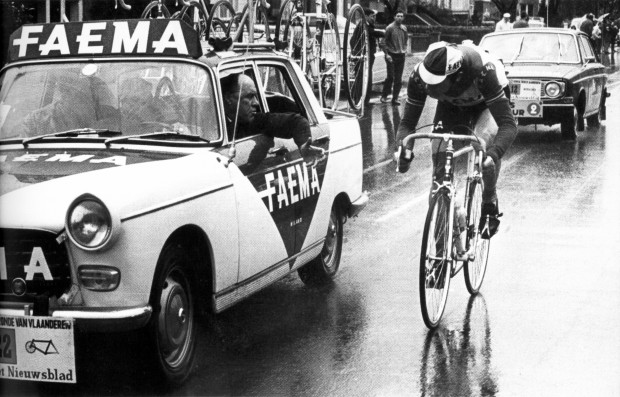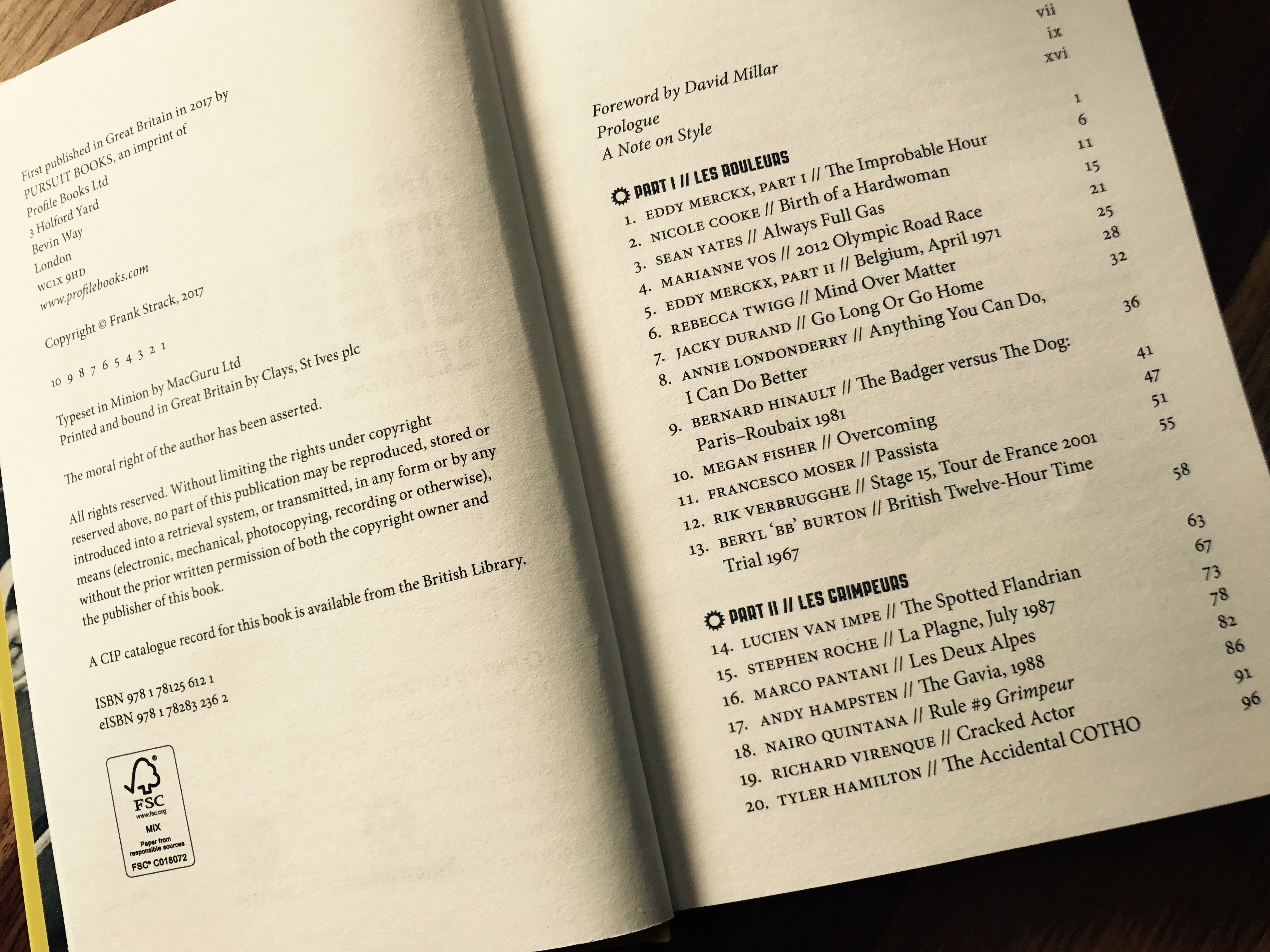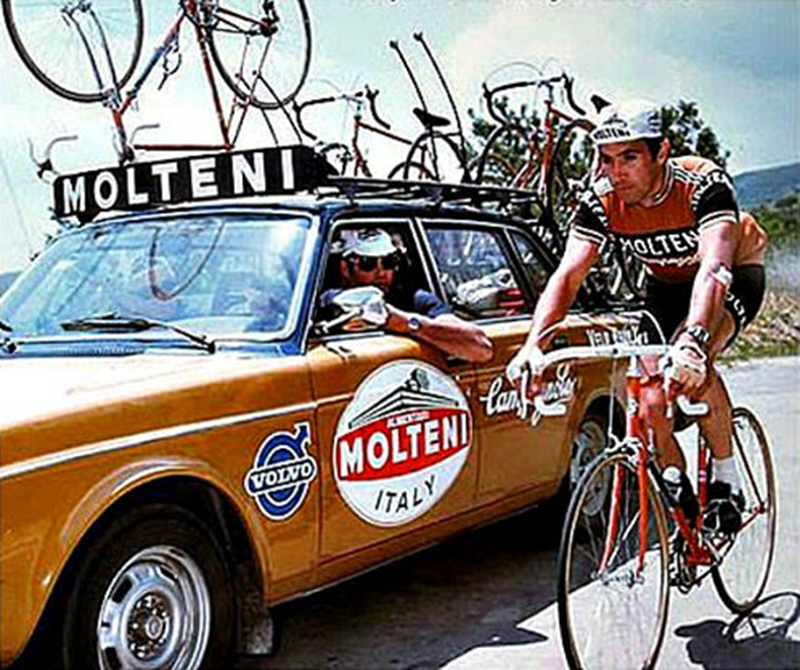Race Radio

Anyone who watched Flanders and Paris-Roubaix can agree that the strongest and most deserving rider won both events; Fabian Cancellara dominated both races and did nothing to lessen his reputation as Spartacus. One thing that that struck me, however, is how significantly race radios factored into how the races played out.
In Flanders, Fabian and my perennial favorite Tomeke Boonen left the lesser men behind them and rode off together to the point in the course where the race was to be decided. Approaching the steepest section of the Kapelmuur, Cancellara pulled up alongside his rival before accellerating and leaving a cramping Boonen behind, gaining something like 15 seconds by the summit.
This was not a real attack. It was…I pushed a gear less and yeah, went, yeah, like steady up with more speed. I heard on the radio that there’s a gap, so I pushed again more.
Aside from his delightful blend of English and German sentence structure, one thing stands out to me in that statement. Fabian did not need to look behind him in order to assess the damage he was doing to his opponent; the news was broadcast to him onhis radio and then all he had to do was “push again more” on those things attached to his feet when he heard there was a gap.
Fast forward a week to Roubaix and we find a similar situation. Spartacus choose a unconventional moment to attack: on smooth roads, some 45km from the finish. It also happened to be the moment when Boonen had dropped to the back of the group to recover from his earlier attacks and survey the group. Cancellara seemingly felt his opportunity through the Force and jumped away, not to be seen again until the velodrome in Roubaix.
As for that moment of clarvoyance, perhaps it was something a little less mystical. According to his director, Bjarne Riis:
I told him to attack on the radio. As soon as I saw that Boonen was not on his wheel, I said: ‘Now you go’.
Applying the perfect amount of dumb, he didn’t hesitate and trusted his director. Riis:
A rider like him, when he goes, it’s because he goes to win, not for fun. I knew it was the right moment and that he was riding to win the race. Otherwise I’d have stopped him immediately.
Now, I don’t believe for a moment that Boonen would not have used the same tools and information to his advantage had the roles been reversed, but in both cases, radio communication – not observation and tactical insight on the part of the rider – determined the race-winning moves; it makes me wonder how the races might have unfolded had they been banned, as the UCI continues to contemplate doing.
I, for one, don’t think the race would have been less exciting without them. I say ban them, and put reading the race back in the hands of the riders.


There was something unromantic about Paris-Roubaix this year, no rain, a failed group break, and no suspense when the die was cast. You may have put your finger on the reason. My vote is dump the radios.
@Rob
I agree. The conditions were perfect with no mud and no dust. Too easy, if it’s possible to call a Paris-Roubaix “easy”. I think the only people who are pro-radio are team directors and riders (although not all of them). I say can ’em. Hopefully someone who disagrees with us will chime in here.
Won’t get any disagreement here. What’s even worse is when riders pull those little Nancy-Boy protests by neutralizing stages radios are banned from. And the argument they make things safer? I doubt a team director can relay a message fast enough that another rider crashed one bike length in front you. If they’re worried about safety have some race official that everyone in the peloton can hear giving updates on wind, road conditions, crashes, whatever. I say keep the Riis’ of the world off the radio and get back to some old skool bicycle racing.
@Marko
Yeah, the radio protest was awful. What a bunch of babies. They all need to go take a refresher on Rule #5.
What more can they want than a police dude with a yellow flag standing in front of crap they shouldn’t run into? I think the radio for safety alerts is fair, but as you say, that should be an official’s radio and it’s all one-way. And maybe one-way back to the team car for bike changes etc. But the way they are controlling the racers is a big bummer. The funny thing is, usually Paris Roubaix is so hard, radios hardly seem to figure…
Michael Barry and David Millar started their pro careers pre-radio and insist getting rid of radios would make racing less formulaic, more inspired. Barry also points out the younger riders can’t read a race as it develops because the directors call all the shots on the race radios. I think they are banning radios in some of the Under-23 races but they should go all the way and try a multiyear ban everywhere. Or maybe just allow the bullhorns on the roof of the team car with the director constantly yelling “VENGA, VENGA, VENGA.” That is fun.
I agree. Maybe Pistolero wouldn’t have been caught out by his teammate Texan when the crosswinds broke up the pack if he’d learnt to race without an earpiece. (Then again, anyone over 14 who still thinks a pistol salute is cool may be incapable of learning much anyway …)
@Geof
Yeah…I think Pistolero is definitely beyond hope in terms of learning. What a wanker. I also think he’s greatly underestimated the impact his director and team had on his record. Not that he probably won’t win again anyway, but…
The funny thing is, he was cool at Discovery – those accelerations against Rasmussen were unbelievable (literally) but really exciting. That was a very memorable day of racing.

What a douche.
+ 1 for NO radios…
Spartacus is slowly starting to annoy me. On the one hand Cancellara can destroy you on the cobbles as he casually “motors” along with his wrists resting on his bars – a sly grin on his chiseled visage as he dishes out the “V”. On the other hand he disingenuously lobbies for rider safety. In the Tour it was a thinly veiled guise to save Schleck the Younger from huge losses in stage two. Now, most recently Faboo has gone on record to say that the radio ban at the 2010 UCI World Championships (in Geelong, Australia) has “placed safety pressures on the cyclists”. Bullocks! Contrary to your assertion “I have seen so many other races where my radio was not working and I still did amazing performances,” you’re starting to sound like a little girl. Get out of the comfort zone of the nurse maid in your ear and Rule #5 it!
My solution? Sure, you can have a radio. But the only thing you will be able to hear in you ear will be race officials as they occasionally alert you to dangers on the road, crashes ahead, etc. That way it’s back to paying attention. Back to seeing determination (or panic) on the faces of the peloton as they drive the pace in uncertainty.
One of my least favorite things about professional road racing is knowing that the peloton is getting second by second info on how fast they need to be going to reel in the break with less than 1k to go. I hate it! The daring souls on the break are disadvantaged enough as it is fighting against the sheer power and numbers of the peloton. But with radios the peloton has little to worry about as they can expend precisely the amount of energy needed to foil the courageous break. How disheartening it must be to know that your only chance is to take a flyer in the hopes that you won’t have to go mano a mano against the world’s fastest douchenozzle. All the while knowing that there is a freight train behind you cruising along in the smug satisfaction of precise calculations being given a direct route from the ear to the legs, bypassing the passion and intelligence that resides in the mind and soul of that former Cat 5 who worked his way to the pinnacle of the sport all without the aid of a radio.
Cancellara told reporters in Geelong “I think it is wrong (the radio ban), we are in 2010, we are in the modern times.” Yeah, well, we benefit enough from modern technology. Our bikes are lighter, more aerodynamic. We “train properly”, being scientifically rigid. We weigh our food. And we have a little voice in our ear giving us precise instructions. Let’s get back to the excitement of the unknown. Real racing. Can I stay away? Did we wait too long to chase? Am I fucked?
@Cyclops
++++++++++++++++++++++++1
What else is there to say?!
Except….these peloton protests fuck me off. I know a lot of the culture in the pro peloton comes from places like France, but think about your workplace….

If you’re pissed off with something, how Rule #5 is it to mince around having a go-slow, or sitting cross-legged in the road like a bunch of CND lesbians?
(Generally, I really liked Pantani and admire many things about him – entertainment value, talent, epic capacity for drugs ets – but here he just looks like a prick)
No! You stomp round to the boss’s office shout at them, wave your fist / smack their head off the table / punch them / offer to jam a track pump up their ass unless they do what you want. Can you imagine (insert legendary hardman of your choice) behaving like that individually? If these guys want more safety they should stick to playing ping-pong for a career.
@ Cyclops – you seriously don’t want to be relying on race officials for vital safety information…